 (4 / 5)
(4 / 5)
There is something incredibly sad about the fact that The Mountaintop is one of a rare number of plays in Wales featuring an all-black cast. Its director, Abdul Shayek, laments as much: “It is 2017 and the fact that this hasn’t happened more often makes me frustrated and sad”. There should be no reason why this is the case. Both the narrative and the performance in this production are of such a high quality. Yet there is a tension bubbling at the heart of it that is so unsettlingly relevant.
The Mountaintop is a fictional depiction of Martin Luther King’s last night on earth. The action takes place in a single room – Room 306 of the Lorraine Motel, outside which the civil rights activist gets shot on April 4th, 1968. The set is no bigger than this – literally the size of a hotel room – making it extremely close, both claustrophobic and intimate. It allows us, the audience, to become privy to Dr King’s final hours in such fine and emotional detail. We see the anguish, laughter, fear and tenacity etched on the face of Mensah Bediako (King) at every turn. Such is the verisimilitude of Katori Hall’s script that there is even time to hear the great man himself go to the toilet, much to the amusement of the school group that had come along to watch. This level of authenticity, played out in real time, allows the conversation between King and hotel maid Camae (Rebecca Carrie) to flow naturally and build organically, with impressive results. The two actors bounce off one another brilliantly. Their timing and pace are perfectly attuned. They appear so comfortable in their working relationship, and so at ease with their characters. It makes for some excellent exchanges, fizzing with sexual chemistry and fermenting emotional intensity.
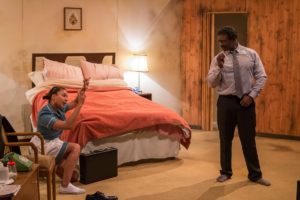
The success of their relationship helps concentrate The Mountaintop on a solid foundation. It helps to retain its integrity as it progresses into what could be considered surrealism. Without giving too much away, a dramatic twist sees the introduction of a heavenly dimension, bringing a sharp focus onto the reality of King’s impending death and his relationship with God. I liked the fact that Hall plays with our expectations, imaging God as both black and feminine. This is a God who is contactable, reachable through the hotel phone. Such is the bizarre nature of this section, King even has a conversation with Her. Yet it is testament to the quality of The Mountaintop’s writing and acting that it never runs off the rails. It is all part of the bigger message which comes into sharp focus at the play’s conclusion.
It is impossible to leave the theatre without responding, in some way, to The Mountaintop’s final scene. A powerful poem – “The Baton Passes On” – begins a subtle change in focus as its message is not only directed at King but at the audience too. Once Carrie finishes this piece, Bendiako stands on a plinth, addressing the audience directly. He evokes the great oratory skills of King to give an emotive speech which leaves you in no doubt about the need to respond. It is an arresting, challenging and profoundly affecting moment. On reflection, it also brings into sharp focus the continuing injustice of Shayek’s observation.
The Mountaintop is a rallying cry for each of us to be the change. It is an excellent production that surely signals for greater diversity in the theatre industry. There is a need for greater representation of minorities on stage, and on this evidence, this should certainly be the case. With an exceptional script, an immersive set, and a highly talented cast, The Mountaintop deserves much wider recognition. So, Welsh theatre industry, support more creative people from BAME backgrounds. On this evidence, you won’t regret it.
Tag Archives: Gareth Williams
Review, To Leave/ To Be Left, Robbie Cavanagh by Gareth Williams

 (5 / 5)
(5 / 5)
Wow. What have you done to me Robbie Cavanagh? I did not expect that. The debut album of this Manchester musician, released this week, stunned me into almost complete silence. Titled ‘To Leave/ To Be Left’, Cavanagh’s first full-length feature may begin with a feel-good beat, but it gradually becomes a mystical, beautiful and haunting piece of musicianship. To touch it would be like caressing the finest of silk. Each of the eleven songs on offer has been carefully handcrafted, honed to such perfection that, if made of wood, your finger would glide smoothly over their surface. It is simply stunning.
The opening track ‘Get Out Alive’ does nothing to prepare you for what is to come. A lively start, it gives credence to the “country artist” label which Cavanagh seems to have been afforded. However, as the album progresses, he breaks away from any generic confines that industry and media moguls might want to place on him. The next couple of tracks seem to slowly move from country-style ballads to something altogether different. Whilst “Godsend” could be attributed to the likes of Andrew Combs, for example, “Reverence” and “Scars” (which follow) have much more in common with the likes of Welsh folk singer Al Lewis. These offer a simple and repetitive backing track played behind an acoustic guitar, and given an otherworldly feel by the slight reverberation that is added to the vocal output. This ethereal quality, which begins with a degree of subtlety in these early tracks, goes on to permeate through the rest of the album. The listener is soaked in haunting melodies and saturated in a spiritual soundtrack. The heart-rending lyrics only seek to elevate the emotional veracity of Cavanagh’s sound. ‘Let You Down’ is heartbreaking. ‘Fool’ is incredibly soulful. ‘Still Talkin’’ is painfully gorgeous.
This is an intimate album. Cavanagh has an incredible ability to create this close atmosphere through his music. It is just you and him. All other potential distractions are completely drowned out. You become lost in the sensitivity and vulnerability of his performance. At one stage, I even found myself brought to tears. I was so overcome with emotion during ‘Sleep Now’, I couldn’t quite believe what was happening. Ironically, the song features the line, “What are you weeping for?” Well, Robbie, I’m not quite sure, but I think it might have something to do with your singing. Whatever the reason, I certainly did not expect that reaction.
Together, this exceptional selection of songs marks Robbie Cavanagh out as an accomplished songwriter and musician. He is a major talent who deserves all the plaudits that will surely come his way with such a breathtakingly beautiful debut. I would strongly recommend listening to ‘To Leave/ To Be Left’. Be warned though. It may leave you speechless for a time. You may also experience some unexpected emotional reactions.

Review, Uncle Vanya, Theatr Clwyd by Gareth Williams
 (4 / 5)
(4 / 5)
Prepare yourself for an immersive experience in the Emlyn Williams Theatre as Uncle Vanya kicks off Theatr Clwyd’s Autumn season. Having experienced the wonderful space known as the Roundabout Theatre earlier in the summer, it was a pleasant surprise to walk into something very similar here. However, whereas the Roundabout relied simply on the cast and audience imagination, the design wizards at Theatr Clwyd, led by Lucy Osbourne, have produced some spectacular scenery, enhancing the audience experience further. Walking in through the entrance, it is like Alice Through the Looking Glass. You are stepping into another world, almost literally, as you make your way across the fairly detailed set to your seat, a magnificent tree branch overarching through the roof above. It really is something to behold. The atmosphere before curtain up only added to the anticipation. There was a certain buzz around the place. Like never before have I known this place to feel so alive.

I believe that director Tamara Harvey has made a very inspired decision in performing Uncle Vanya ‘in the round’. Throughout the play, the close proximity to the audience of the actors made for an intensity of drama and emotion that would not have been so keenly felt in a proscenium. It was, in some ways, a unique experience to witness the faces of these characters so closely and to see their emotions clearly. Even now, a day later, as I am writing this, I can’t believe that my memory is able to evoke Oliver Dinsdale (Astrov) in such detailed fashion. Was he really that close to me? Yes, and what a difference that familiarity makes, not only in the moment but in the recollection too.
It truly is an evocative experience. Being ‘in the round’ helps enormously to achieve this, but it is also enhanced in a number of ways. Firstly, the costumes are of such fine and exquisite detail, perfectly suited to the period in which Vanya is set. The props only compliment this further, to the extent that it often feels like you are watching through a lens, filming, with your own eyes, a television drama. The most beautiful piece on display is the map that Astrov (Dinsdale) rolls out across the dining room table. Its colours are so striking, so meticulously drawn, the sense of realism is startling. Osbourne and her team deserve a standing ovation for their work, never mind a round of applause.
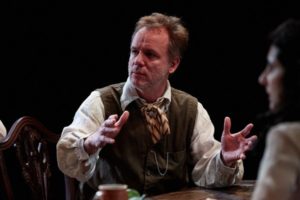
This magnificent set would be nothing though without a group of actors to bring it to life. Leading the cast is Jamie Ballard as the depressed and downtrodden, yet very humorous, Vanya. Ballard injects much regret into his character that teases itself out in playful pessimism and childish boredom. It is so easy to fall for him as a character. His well-thought out arguments, witticisms and acute personal observations make him a very likable person. Ballard reminds me very much of Tom Hollander in the way that he fully embodies his character. He is not just playing Vanya here. He is Vanya. Whereas some productions would struggle to fill the void left by such a fine performance onstage, there is no danger of that here. When Ballard is absent, it is not particularly noticeable. This is testament not only to the quality of Peter Gill’s script, but to the supporting cast as well. In particular, I would like to pick out Rosie Sheehy whose performance, as Sonja, was achingly beautiful. You could not only see the unhappiness etched on her face, it was possible to feel it too such was the intensity of her presentation. To communicate so affectingly reveals the strength of her acting skill. She was simply superb.
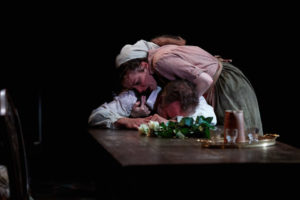
Uncle Vanya has certainly left its mark on me. It is an experience that will stay with me for a while yet, I’m sure. It shows that this production is an affecting piece of theatre, and its immersive set and talented cast only serve to make it so. Tamara Harvey has delivered on many levels, taking Anton Chekhov’s original work and producing something fresh that does not feel over a century old. She has also helped cement ‘in the round’ as my preferred style for performance theatre. Uncle Vanya is definitely worth checking out.
https://www.theatrclwyd.com/en/whats-on/uncle-vanya/
Review Llechi, Pontio by Gareth Williams

 (4 / 5)
(4 / 5)
Having missed it first time around, the chance to catch the restaging of Llechi seemed too good to miss. Originally performed as part of Pontio’s opening season, this eclectic mix of visual, musical and aerobatic art forms was a fascinating watch. It was engaging from start to finish, featuring a host of performers, all of whom played their part in making this a thoroughly enjoyable and captivating show. Despite its fluency in the Welsh language (with the exception of poet Martin Daws), I, a humble learner of the lingo, still managed to be entertained and entranced by the spectacle on offer. It was a delightful performance that offered plenty of emotion and a real sense of place.
Originally curated by alt-folk group 9Bach, the Welsh sextet returned to lead a talented cast in this fresh and innovative approach to storytelling. Taking us on a journey through the history, culture and traditions of the slate industry, this performance brought to life, in a new way, the story of local Welsh slate – the people, and the landscape. Full of experimental sounds and a mix of genres, it spans the centuries. This huge timescale is reflected in the song choices: from a spine-tingling rendition of Welsh hymn Dyma’r Gariad to the bass-fuelled beats of ‘90s rave music. There is no clash of musical styles here however. Instead, 9Bach have managed to create a very diverse yet complimentary soundtrack. The changes of tone, mood and tempo that take place throughout are at no point jarring. Instead, with help from the lighting, each transition is smooth and natural. It is something that could so easily have been a disaster. Here, though, it not only works well. It works incredibly well.
Alongside the musical prowess of 9Bach, choreographer Kate Lawrence and her team offered up some stunning physical performances in the air. It helped being seated on the lower balcony to watch these four talented dancers move across the auditorium. It was clear that many of their actions were reflecting the movements of quarrymen. But their pieces also featured an elegance that conveyed something of the local landscape too. Their graceful movements made for a mesmerising sight. But it also brought to mind, as a result, the ethereal and mythic quality of the mountains and the quarries. This was complimented perfectly, at one point in particular, by the hauntingly beautiful vocals of Lisa Jen Brown. Truly evocative, the backdrop of images that featured in the show were sometimes superfluous as a result. It was a strangely immersive experience.

I came away from Llechi desperate to buy the soundtrack. The music was wonderfully inspirational, eclectic and truly evocative of its Welsh setting. 9Bach have delivered a beautiful collaboration that is full of heart. It is a love story that awakens the senses and births a spirit of hope. It says that this land is not forgotten to another age. Instead, it evolves, becoming the place of the next generation who follow in the footsteps of their forbears whilst carving out new paths of their own. Sadly, the soundtrack isn’t available to buy (hint to anyone who may be able to change that.). Nevertheless, it will stick in my mind for a long time to come. Llechi is a truly memorable piece of contemporary Welsh art.
https://www.pontio.co.uk/Online/Default.asp
Review, Alice in Wonderland, Grosvenor Park Open Air Theatre by Gareth Williams

 (4 / 5)
(4 / 5)
What a glorious day for my first visit to Grosvenor Park Open Air Theatre. Whilst many people were dashing around Chester city centre in search of Pokemon, I ambled along to the city’s park in search of Wonderland. My discovery came in a somewhat fairy tale fashion. Entering through the park gates to see the outline of the theatre, I followed the path around and slowly, emerging from behind the trees, was this towering structure that fitted perfectly with the surrounding landscape. Tucked away in the corner was the marquee entrance. My moment of wonder continued as I wandered in. It was like entering a dream: a popcorn machine, sweets trolley, crafts of miniscule shapes and sizes, decorative displays and signs full of colourful and wispy words. I had certainly found Wonderland. Now I just had to find Alice.
I had arrived a good half an hour before the start time. I took my seat on the picnic terraces and soaked up the atmosphere. It was already half full with excitable children, doting parents and hungry grannies and grandads. People were tucking into strawberries and cream and bags of popcorn. All manner of tasty treats were being drawn from huge hampers (made up for your arrival when you pre-order). They were sipping champagne and clasping coffee cups. Some were slapping on suncream; others adjusting hats and sunglasses. It all felt rather like centre court at Wimbledon.
It was a fabulous build up to the main event. I had already enjoyed myself, and was soaking up what would be the last of the afternoon sun as the play began. I had completely forgotten my search for Alice. Now, there she was. Except there was not just one, but two. First, Anna Leong Brophy appeared as Alicia. Then, Rebecca Birch followed as Alice. Two best friends with similar names and a slightly different take on Lewis Carroll’s famous tale. Glyn Maxwell’s adaptation of Alice in Wonderland sees Alice (Birch) descend down the rabbit hole first. There she meets not only the White Rabbit (Tom Connor) but all the other eccentric characters too. Caterpillar (Jonathan Dryden Taylor) is a science teacher. Humpty Dumpty (Daniel Goode) likes his food a bit too much. The Cheshire Cat (Caolan McCarthy) is suitably clued up on Cheshire history. And, of course, the Mad Hatter (Alex Mugnaioni) is as mad as ever.
In Maxwell’s adaptation, Alice’s journey through Wonderland ends in her becoming the Red Queen. The second half of the play sees a rescue mission of sorts take place. Alicia (Brophy) descends down the rabbit hole in search of Alice. Both their journeys are full of wonderful wordplay and hilarious humour. There is a smorgasbord of accents among the cast of characters which add an extra dimension to their individual personalities. Above all else, the audience interaction is brilliant. It provided an extra layer of enjoyment and laughter. It also drew you into this strange and exciting world. I found myself welling up once or twice as the actors engaged the younger members of the audience. In particular, one little girl (who had come dressed as Alice) was given a high five by Birch on her final exit. I can’t imagine how special that would have made her feel.
The whole cast gave an accomplished performance. The musical ensemble was brilliant and worked well in the absence of technological sound effects. There was one person who caught my eye in particular though. Tom Connor was fabulous in all his guises. His physicality and facial expressions as the White Rabbit and March Hare were a joy to behold. His animated performance added much to his comic value. Even when out of costume and simply part of the ensemble, he was engaging the audience and looked in his element. That natural enjoyment speaks volumes and only adds to the audience satisfaction.
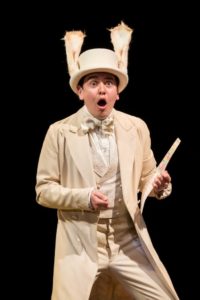
It began to rain towards the final few minutes. It did not dampen the spirits though. This was a fantastic two hours full of fun and frolics. The team behind this production should feel very proud of their achievements. From the exciting entrance to the performance itself, the whole experience immersed you into the weird and wonderful world of Alice in Wonderland. I couldn’t think of a better way to spend a Sunday afternoon.
https://www.storyhouse.com/event/alice-in-wonderland
Review, Out of Love, The Roundabout Theatre at Theatr Clwyd by Gareth Williams

 (4 / 5)
(4 / 5)
Jodie Whitaker may be everyone’s new favourite female of the moment but my eye has been drawn to someone less well-known. In my second trip to the Roundabout Theatre in a week, a process of regeneration had seemingly taken place. Having taken my first steps into the pop-up theatre last week for the world premiere of Black Mountain, I had returned seven days later for another debut show. To my surprise (and delight), I found the same three actors from Brad Birch’s play starring again, this time in Out of Love by Elinor Cook. They had undergone a transformation which now saw Sally Messham and Katie Elin-Salt playing best friends Lorna and Grace. Hasan Dixon was now playing a host of male characters, showcasing his talent for versatility. However, it is Elin-Salt who has caught my undivided attention.
In Out of Love, Elin-Salt plays the lovably naïve Grace. Wearing a dungaree dress and plimsoll shoes, there is something eternally childlike about her character. Above all else, I think it is the expressive acting of Elin-Salt that conveys this with such success. She flails about on the floor, swings her legs up and down; her arms are constantly in motion, her shoulders slightly elevated; and her mouth seems to return to the default position of “slight frown” after every piece of dialogue. It is the intimate nature of this round theatre that allows the audience to pick up on such small details. This adds to the quality of the characterisation which, in Elin-Salt’s case, is near perfection.
The retention of her South Walian accent is a stroke of genius. Elin-Salt’s ability to utilise the musicality of her accent in order to convey such contrasting emotions is pure joy to the listening ear. In Black Mountain, she flattens its naturally-high pitch to express a degree of seriousness. In Out of Love, she emphasises it. This gives a comical edge to Grace that increases her likability. It also enables for the exploration of sex and sexuality. Not that this cannot be talked about in a serious way. However, Cook’s decision to examine it from the perspective of two female adolescents makes for a more naturalistic, animated and frank discussion.
There is also a vulnerability to Grace which Elin-Salt beautifully conveys – a deep desire for intimacy that hints at jealousy towards Lorna’s ability to pull men. For the supreme closeness of these two best friends, there is also a hidden tension. It is testament to the quality of Cook’s writing that this unspoken emotion never bursts onto the stage. Instead, it is veiled beneath some rather ambiguous words and actions. Through her performance, Elin-Salt manages to capture this ambiguity perfectly. She peels back the depths of Grace’s heart, ever so slightly, to subtly reveal her concealed motives. She manages to do this so imperceptibly that I could not help but burst with admiration towards the depth of her acting skills.
Out of Love is a suitably complex portrayal of female friendship. Elinor Cook presents an entertaining and engaging narrative featuring two female protagonists over some 20-30 years of their lives. Sally Messham gives an accomplished and controlled performance as Lorna. She does not put a foot wrong and perfectly complements her fellow lead. It is Katie Elin-Salt who wins much of the applause from myself however. Not excluding the above, her natural enthusiasm and depth of imagination make her an infectious talent. She weaves such fine complexity and depth of character into her performance. She is a delight to watch. She also makes a strong case for championing a great deal more female-led narratives. This is one reason to be excited at Whitaker’s casting. But whilst I await her arrival as the 13th Doctor, I shall revel in the discovery of another talented actress. Katie Elin-Salt is, surely, a major talent in waiting.
A Theatr Clwyd, Paines Plough & Orange Tree Theatre co-production | Directed by James Grieve
https://www.theatrclwyd.com/en/whats-on/out-of-love/
Review, Black Mountain, Roundabout Theatre at Theatr Clwyd by Gareth Williams
 (4 / 5)
(4 / 5)
Welcome to Roundabout. This unique pop-up theatre is taking the UK by storm. It is a masterful piece of engineering. Fully transportable, it is popping up in the most unlikely of places, including car parks, churchyards, seafronts, and housing estates. It takes six people about a day to construct, and needs nothing more than an Allen key to assemble. It is innovative, ingenious and distinctive. Its round white body is certainly noticeable alongside Theatr Clwyd, its current resting place. To have the opportunity to watch a play inside this intriguing structure was a very thrilling prospect.

The early signs were less than promising. Walking in, I could hardly see where I was going. The darkness was overwhelming. The theatre itself wasn’t much better. It was like entering a poorly-lit spaceship. I’d wandered onto the set of an early Doctor Who. I’d been transported back to the age of the 1950s B-movie. The media images seen beforehand only compounded matters further. It was a lot smaller than the press photos had made out. A technical fault at the start meant that my excitable early expectations were now almost entirely extinguished. I was really disappointed. But then the play began.
Black Mountain is a psychological thriller of the highest degree. It sees Rebecca (Katie Elin-Salt) and Paul (Hasan Dixon) travel to an isolated house in the country in an attempt to save their relationship. Writer Brad Birch has created an intriguing and unsettling plot that bubbles away with tension and drip feeds paranoia. The engrossing nature of his script meant that my initial shortcomings quickly dissipated. The intimacy of the space became its strength rather than a distractive weakness. The lighting effects used throughout were essential in the creation of a dark and disturbing tale.
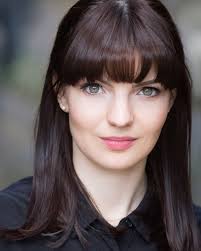

Dixon is exceptional as the stuttering Paul. He conveys a sense of deep discomfort with relative ease. You can tell his character is walking on eggshells. He has a secret to hide from his wife Rebecca. She knows something is going on, but will he admit it? Birch doesn’t make it easy. Elin-Salt brings an intensity of strength to Rebecca that makes her appear a very confident woman. It is testament to her acting skills, however, that this confident exterior also harbours an unsettling tone. There is something deeper brewing beneath the surface. She is holding on to something. But what is it? Birch draws this out across sixty compelling minutes with his absorbing dialogue.
If you enjoyed recent television dramas The Replacement and Doctor Foster, this will be another similar storyline to savour. In some ways, the live action makes for an even greater thrill ride through the tempestuous relationships on stage, particularly as Rebecca turns the screw and the appearance of Helen (Sally Messham) muddies the waters for Paul. It becomes an increasingly sinister play, utterly gripping and completely enthralling. Ultimately, I came out of the darkness having seen the light.
Black Mountain is an absorbing play. The cast are absolutely fantastic and the direction is excellent. There may be some improvements to be made on the initial entrance to the Roundabout theatre. There is nothing but positive feedback on its content here though. An impressive debut for Paines Plough in North East Wales.
To find out more about Roundabout Theatre, click here.
Review, Gregory Porter, Llangollen International Eisteddfod by Gareth Williams

 (5 / 5)
(5 / 5)
In some ways, Gregory Porter was made for the International Eisteddfod. The man whose music transcends was making his debut at the annual event. Bringing his sweet, smooth and soulful sound to a warm and pleasant Friday evening, Porter is the embodiment of the festival’s message of peace and love. It is little wonder that he was rapturously received by a cross-generational crowd that pretty much packed out the Llangollen Pavilion.
There is always a message behind his music, and his choice of songs here balanced nicely between songs of relevance and well-known hits. His most famed, Liquid Spirit, certainly encouraged audience participation on the hand clapping front. Hey Laura got the biggest cheer of the night on its introduction. It is his shifts in tempo and mood – including between these two songs – that make Porter’s set constantly fresh and teaming with life. It also makes the acoustic parts of his set – just him and Chip Crawford on piano – that much more powerful. His impromptu rendition of Nat King Cole’s (I Love You) For Sentimental Reasons was especially moving. Contrast that with a toe-tapping rendition of Papa Was a Rolling Stone, and you begin to see the diversity of his set.
He also had time to offer some thoughtful and inspiring words that chimed perfectly with the Eisteddfod’s values. Porter is a great believer in the power of music. It brings people together. It is spiritual, emotional, physical. It is a great healer. It is a builder of bridges across divisions in society. It is what the International Eisteddfod aims to do. And Porter certainly honoured those things. He, along with his band, were exceptional. From the organist to the double bassist, the French horn player to the saxophonist, they were all on sparkling form. The standing ovation at the end was thoroughly deserved.
Gregory Porter never feels like a man who craves the limelight. He was completely absent from the stage at times, the band performing independently of him. The music is the star of the show. That humble and sincere belief is something that has won Porter legions of fans. It is also the reason his presence at the Eisteddfod was a perfect fit. A match made in heaven.
Series Review, Broken, BBC by Gareth Williams
 (5 / 5)
(5 / 5)
Father Michael Kerrigan is the latest name to add to the growing pantheon of priests appearing on our television screens in recent years. Following in the footsteps of Tom Hollander (Rev), James Norton (Grantchester) and Mark Williams (Father Brown) is another acting heavyweight, Sean Bean. Bean takes the lead role in writer Jimmy McGovern’s latest drama, Broken. The six-part BBC series has seen Kerrigan battling his own personal demons whilst acting as counsellor, social worker and friend to his parishioners. The narrative has been suitably gritty, tackling poverty and injustice unashamedly through the lens of social realism. It is, of course, what McGovern does best. It could even be argued that Broken is among his best work.
Sean Bean is a fascinating lead actor. He is utterly mesmerising here. The emotion etched on his face conveys perfectly the inner turmoil and wretched guilt of his character. There is no need for words. He makes Kerrigan so likable, so genuine. It is hard not to fall in love with his character. His flaws and his mistakes and his heartfelt pleas only increase our empathy for the man. Kerrigan is broken. Yet in his brokenness we see something of our humanity – for better and for worse.
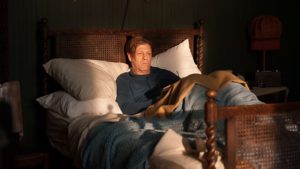
The opening credits seem to capture this sense of conflict perfectly. It is so beautifully melancholic: the heart-rending tones of Nina Simone singing “Human kindness is overflowing/ And I think it’s going to rain today”. It is this overwhelmingly positive image streaked with an impending sense of despair that wonderfully encapsulates the stories at the heart of this drama. In particular, the investigation into the death of Vernon Oyenusi (Jerome Holder) places a focus on PC Andrew Powell (Mark Stanley) as he wrestles with the personal and professional consequences of telling the truth. He wants to do the right thing, but there is a cost for doing so.
McGovern finds rich material here. He touches on some of the hypocrisies of the institutional church. He tackles issues of homosexual acceptance and the morality of gambling. There is also the moment when Kerrigan faces up to one of his former teachers who, as we see in flashbacks, abused him. The lack of remorse shown by Father Matthew (Robert Gillespie) is infuriating to say the least. Yet Kerrigan’s response is measured. He doesn’t lash out in justifiable rage yet the emotional anger underneath is evident in this incredible exchange. Again, Bean’s acting is masterful.
The standout episode of this fascinating series has to be the fourth offering. It finds single mother Roz (Paula Malcomson) facing up to the reality of her fraudulent past. She owes over £200,000 to her employer and confesses to Father Michael that her only way out is to take her own life. It is complete dramatic perfection from McGovern: raw, heart-breaking, full of understated emotion and grounded in the ordinary reality of daily life. It is also where Broken becomes an ensemble piece rather than simply a protagonist-led drama.
Jimmy McGovern is a master at creating fully-formed and multi-layered characters. The leading light in this drama is certainly Kerrigan. However, as the series progresses, he becomes like the candle he lights to declare the presence of Christ. This simple yet powerful motif reflects Kerrigan’s role in the community: he is present amongst his parishioners but he is no superman solving all their problems. He is there for them, but he is helpless as much as he is helpful. He is part of their lives, but they have their own stories to tell – he does not define their decisions or determine their choices necessarily.
The place that McGovern gives to Father Michael Kerrigan is far less certain than the clear morality of Sidney Chambers’ crime-solving world in Grantchester. Yet it is somewhat more assured than the struggle for relevance that faces Adam Smallbone in Rev. This is what makes Broken such a fascinating series, particularly in the canon of TV shows with a clerical protagonist. For McGovern, the church remains a place where hope is found. But this hope is expressed through the individual (Kerrigan) rather than the institution (as represented by Adrian Dunbar’s Father Peter Flaherty). In this way, the final scene makes perfect sense. Being critical, it could be seen as a little too perfect, almost sentimental. Nevertheless, it still elicited a few tears from me in response.
Broken is an excellent and inspiring drama. It continues Jimmy McGovern’s reign as one of Britain’s best and most provocative of writers. The acting talents of Sean Bean, et al. only add to the sheer quality on display here. It is surely one of 2017’s best dramas.
Review, Beginnings, Hannah’s Yard by Gareth Williams
 (4 / 5)
(4 / 5)
The release of debut album Beginnings is surely the start of something special for Hannah Layton Turner. The musical collective known as Hannah’s Yard have released a fascinatingly eclectic record. Here are 14 songs that span across a variety of genres. We have a mixture of folk, pop, country, jazz and swing. They combine to create an album full of musical flavour, that doesn’t sit neatly into one particular category. The opening song “Why Would I Know” offers a laid back, easy listening sound; “Doin’ It for Myself” is an inspiring and upbeat pop song; and “I Want You” is a gear shift into jazz and swing. Then, in another key change, Hannah duets with fellow band member Barnaby Pinny on country-sounding ballad “Here and Now”, with the country/folk influence continuing in later songs “Baby I’m There” and “Dance Our Way Back”. This mixture of musical styles works, in part due to the naturally confident and adaptable voice of Turner. Her melodic vocals make for a seamless transition between songs. Her purely vocal intro to final track “Amazing Grace” shows off her vocal prowess – a captivating sound that calls for a devoted listening ear. This last song is a nod to Olney, the small English town where they are based and where the original was first written in the 1770s. Surely Hannah’s Yard is destined to be known further than their Buckinghamshire base however. With such a range of musical tastes, they have produced a lovely and surprising album that would be a welcome soundtrack to many people’s summer.

